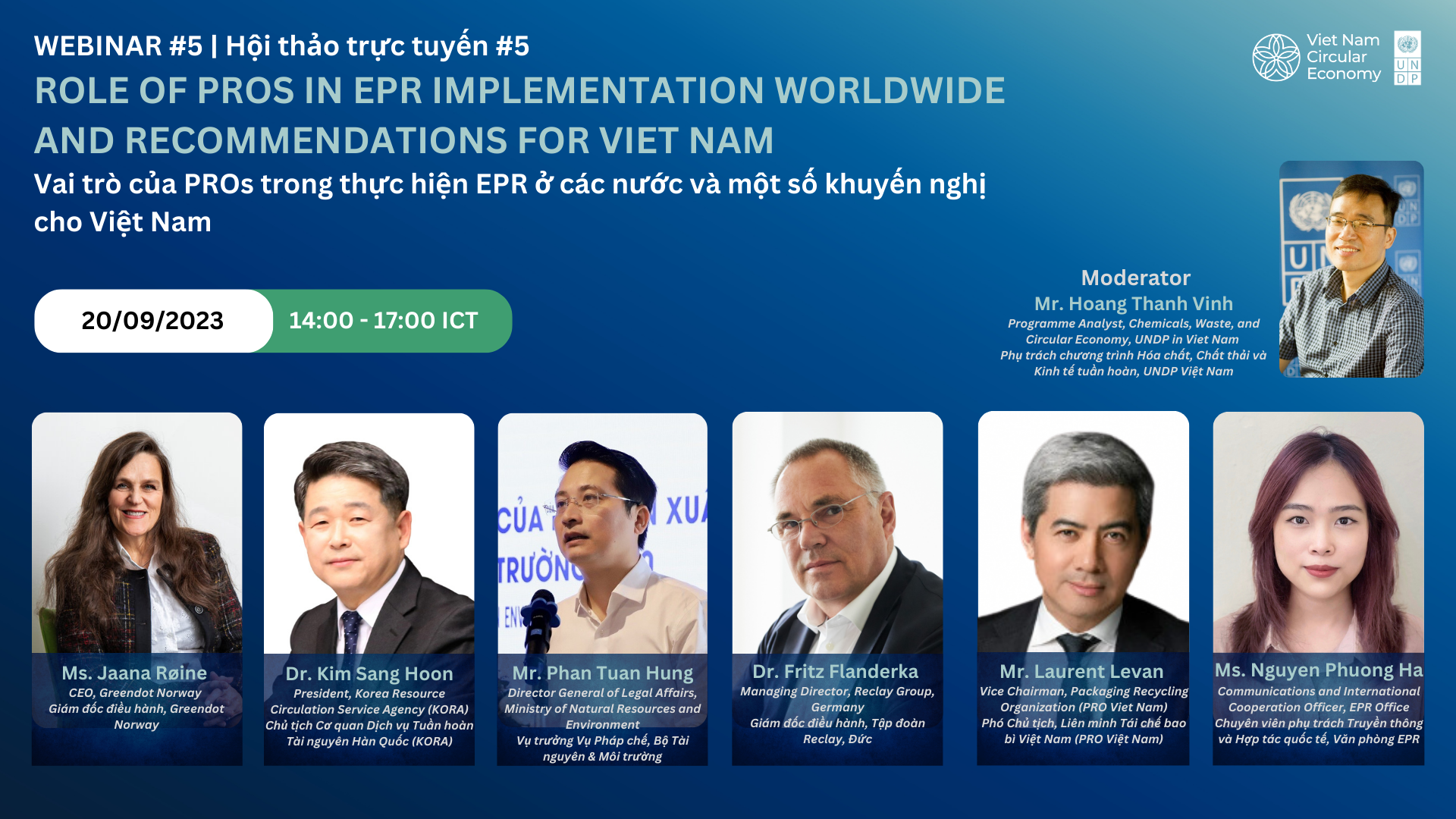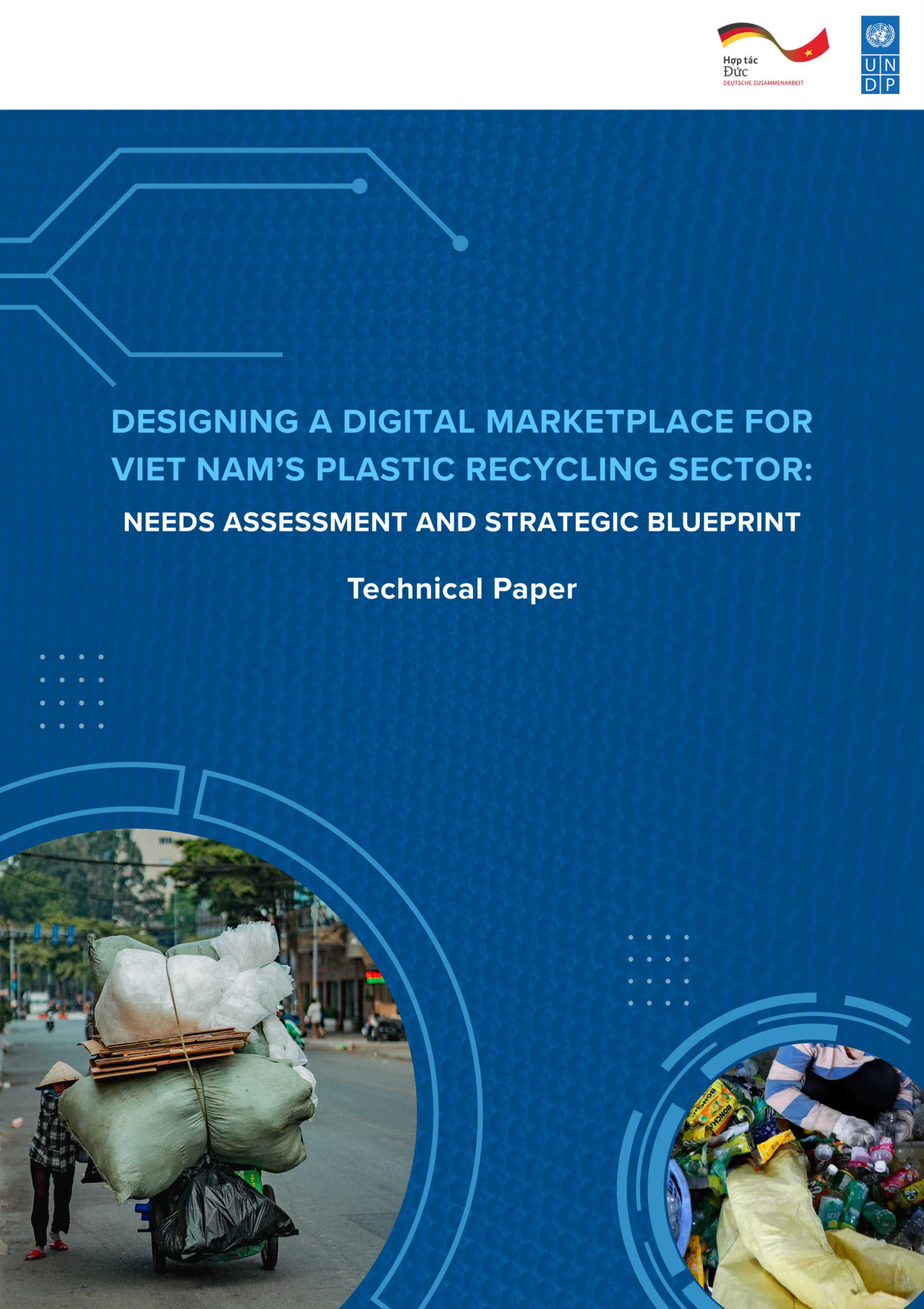Webinar “Role of PROs in EPR implementation worldwide and Recommendations for Viet Nam”

The webinar, titled “The Role of PROs in Global EPR Implementation and Recommendations for Vietnam,” was organized by the Vietnam Circular Economy Network on September 20. The event garnered participation from over 170 individuals, including experts, business representatives, and policymakers, nonprofits and members of Producer Responsibility Organisations (PROs) from across the globe, attending both in-person and online. The theme of the webinar centered on the crucial role and historical evolution of PROs in the implementation of Extended Producer Responsibility (EPR) in Germany, Norway, and Korea, along with customized recommendations for Vietnam.
Ms. Nguyen Phuong Ha, Communications and International Cooperation Officer from EPR Office, Ministry of Natural Resources and Environment (MONRE), commenced the proceedings by presenting the current regulatory framework and provisions governing Extended Producer Responsibility (EPR) in accordance with the Environmental Protection Law and associated regulatory documents. Additionally, Ms. Ha provided guidance to businesses on the processes of registering, declaring, and reporting their responsibility for recycling products and packaging, as well as contribution to the Viet Nam Environment Protection Fund through the National EPR Portal.
Following this, Mr. Fritz Flanderka, CEO of Reclay Group, delved into the historical roots of EPR in Germany, tracing its origins back to the late 1980s and chronicled the formation of Germany’s initial PRO, operating as a single entity in a monopolistic market, and the subsequent transition to a competitive market structure aimed at enhancing system productivity and efficiency. Furthermore, Mr. Flanderka introduced the fundamental principles of an effective EPR model, and gave out some recommendations for Viet Nam, notably PRO having nonprofit status, being run and controlled by producers and with the engagement of informal waste workers.
During the seminar, Mr. Kim Sang Hoon, Chairman of the Korea Resource Circulation Service Agency (KORA), provided an overview of Korea’s waste classification regulations, the EPR mechanism for packaging, institutional responsibilities, mandatory recycling rates, recycling cost norms, and recycling processes for various types of packaging. He also highlighted KORA’s reporting, storage, and information collection system. Mr. Kim noted that Korea’s PRO model operates exclusively, with KORA as the sole actor responsible for collecting and recycling packaging for manufacturers and importers, having achieved an 80% packaging waste recycling rate by 2021. He emphasized the importance of standardized waste classification guidelines and public awareness campaigns as crucial factors in Korea’s EPR success, recommending a similar approach for Vietnam.
Ms. Jaana Røine, CEO of Greendot Norway, initiated her presentation by comparing geographical conditions between Vietnam and Norway. She introduced Greendot Norway, shedding light on the organization’s operational cost structure, collaborations with urban collectors, opportunities and challenges associated with whether the PRO is a single PRO or if there are multiple PROs within the same EPR system. She drew attention to the paradox where improved recycling results translate into higher fees for members. This paradox arises due to initial infrastructure investments, the costs of expanding collection and recycling activities, and increased expenditures on media education and awareness campaigns while the number of manufacturers and importers assuming recycling responsibility remains limited.
The event’s final speaker, Mr. Laurent Levan, Vice Chairman of Packaging Recycling Organization (PRO Viet Nam), presented the organization’s vision, mission, principles, and strategic directions entailing behavior change communication activities, the development of recycling technology, and the implementation of packaging collection and recycling initiatives. Mr. Levan detailed PRO Vietnam’s organizational structure and highlighted its achievements in 2022, including the successful collection and recycling of over 3,000 tons of PET in three months and 340 tons of UBC (carton milk cartons) in eight months. Notably, PRO Vietnam has applied to become a PRO (Producer Resposbility Organisation) since the end of last year. He also noted PRO Vietnam’s expansion plans for 2023, targeting a broader range of packaging types, including aluminum cans, paper, cardboard, HDPE plastic, and mono-material packaging and laminate packaging.
In addition to these enlightening presentations, the ensuing discussion and Q&A session included active participation from Mr. Phan Tuan Hung, Director General of Legal Affairs from MONRE, enriching the discourse with valuable insights and perspectives on the future of EPR in Vietnam. The panelists delved into various critical topics, including the most suitable PRO mechanism for Vietnam during the initial phases of EPR implementation, banking assurances for PRO organizations, the eligibility criteria for PRO registration. and strategies to achieve high recycling rates for flexible packaging.
Additionally, Ms. Mette Moglestue, Deputy Ambassador of Norway in Vietnam, shared insights into Norway’s successful implementation of EPR during the workshop. Remarkably, Norway boasts a 92% collection rate for plastic bottles, with an impressive bottle-to-bottle recycling rate. This achievement has been made possible through the recent adoption of the Deposit Return Scheme in the country.
Key takeaways:
- Early-Stage EPR: During the initial phases of EPR implementation, the consensus leaned towards having a single, non-profit PRO. This approach ensures high information transparency and reduces monitoring requirements for relevant authorities.
- Competitive, For-Profit PROs: The discussion shed light on the limitations of deploying multiple competitive, for-profit PROs. Such an approach tends to focus on easily recyclable packaging in densely populated urban areas with substantial consumption of packaging and products. Consequently, achieving recycling targets for rural areas or certain ‘difficult-to-recycle’ packaging types becomes challenging.
- Reducing Packaging Waste: The paradox of “better recycling results leading to higher fees for members” was highlighted as a potential hindrance. This scenario may discourage businesses and PROs from voluntarily exceeding the current regulatory recycling rates. Thus, businesses are encouraged to invest in research aimed at minimizing the volume or number of packaging and products falling under EPR coverage.
- Private Sector Management of PROs: The discussion emphasized that when enterprises, rather than the state or state-owned companies, manage PROs, EPR fees remain independent of the state budget. This ensures that EPR fees accurately reflect the operating costs of PROs. Such an arrangement mitigates the risks associated with diverting PRO budgets for other purposes or into the general budget, as well as the risks of corruption, capacity deficits, lack of professional experience, and resource shortages when PROs’ ownership belongs to the state.
For further reference and registration for other conferences taking place during the same period, please visit our website here.














